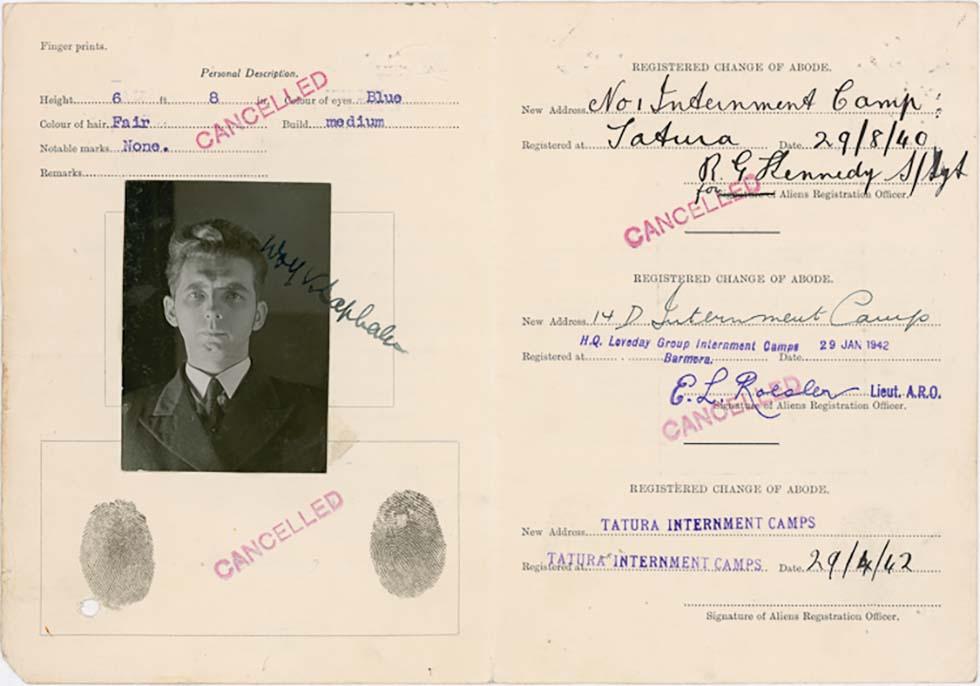


Transcript
Finger prints.
[Heading] Personal Description.
Height [typed] 6 [end typed] ft [typed] 8 [end typed] in. Colour of eyes [typed] Blue [end typed] Colour of Hair [typed] Fair [end typed] Build [typed] medium [end typed] Notable marks [typed] None. [end typed] Remarks [nothing written]
[Stamped in red over previous paragraph] Cancelled [end stamped]
[A black and white photograph of a young man, staring dead at the camera. He has a thin nose and lips, with a formal hairstyle. He is wearing a suit and tie.]
[Handwritten over photograph] Wolf Klaphake [end handwritten]
[Two fingerprints on the page within a box. Between the fingerprints 'Cancelled' is stamped in red]
[Heading] REGISTERED CHANGE OF ABODE
New Address [handwritten in black ink] No. 1 Internment Camp. [end handwritten]
Registered at [handwritten in black ink] Tatura [end handwritten] Date [handwritten in black ink] 29/8/40 [end handwritten]
[handwritten in black ink] R.G. Kennedy S/Sgt
For [end handwritten] [crossed out in black ink] Signature of [end crossed out] Aliens Registration Officer.
[Stamped in red over the top] Cancelled [end stamped]
[Line break]
[Heading] REGISTERED CHANGE OF ABODE
New Address [handwritten in black ink by a different hand] 14 D Internment Camp [end handwritten]
Registered at [typed] H.Q. Loveday Group Internment Camps Barmera. [end typed]
Date [typed] 29 Jan 1942 [end typed]
[signature in blue ink] E. L. Roeolen [end signature] [typed] Lieut. A.R.O. [end typed
Signature of Aliens Registration Officer.
[stamped] Cancelled [end stamped]
[line break]
[Heading] REGISTERED CHANGE OF ABODE
New Address [typed] Tatura Internment Camps [end typed]
Registered at [typed] Tatura Internment Camps [end typed] Date [handwritten in black ink] 29/4/42 [end handwritten]
[blank]
Signature of Aliens Registration Officer.
About the record
This is an internment document for Wolf Klaphake, a German-born scientist. It shows him facing towards the camera in an official photograph.
Education value
- Klaphake was born on 5 March 1900 in Zeitz, a small town in south-eastern Germany. His father, Josef Klaphake, was the director of the local abattoir. When Wolf was one year old, his father died. Wolf, his sister Kitty and his mother moved to Leipzig, where Wolf went to school. After a six-month stint with an artillery regiment in Belgium, he returned to Leipzig to attend university. in 1923, he graduated with a doctorate and moved to Berlin to work as a chemist for the Schering-Kahlbaum company.
- In 1935, Wolf Klaphake and his wife Maria emigrated to Australia. They initially rented a house in Melbourne on Riddell Parade, Elsternwick. They moved to Sydney in 1936, renting on Maclean Avenue, Chatswood. Klaphake worked first as a consultant chemist, and then for Industrial Microbiology Pty Ltd. This company was set up to fund Klaphake's research and then exploit the inventions he would make.
- The Klaphakes' decision to settle in Australia (rather than, say, in Britain) was informed by Wolf's desire to develop a dew condenser. As a dry continent, Australia was likely to need alternative sources of fresh water and the Premier of South Australia had shown interest in Klaphake's invention of a structure 70-feet tall, which was supposed to condense a thousand gallons of water per day. Australia was one of many countries that would have welcomed the Klaphakes. They were young, non-Jewish, highly educated – and, unlike most other people emigrating from Nazi Germany – able to take their savings out of Germany.
- From 1940 to 1944 he was interned as an 'enemy alien'. When the Second World War began, the Australian security services raided the German consulate in Sydney and intercepted its mail. They found records with names and addresses of Nazi Party members living in Australia. According to these records, Klaphake was member 3452978. But throughout his internment, he insisted that he was opposed to Nazism. In spite of his internment, which he considered grossly unjust, Klaphake decided to remain in Australia. He applied for naturalisation soon after his release. Klaphake's application was granted, and he was naturalised in September 1946. Earlier he had handed back his German passport, and signed a statutory declaration saying that he did not intend to retain his German nationality.
- On 2 March 1945, Maria Klaphake died in Sydney, aged 41. Her husband claimed that his internment was to blame for her death. Maria and Wolf's marriage was no longer a happy one in the final years of her life, but she remained a loyal supporter of her husband to the end. Her own internment was, at least partly, due to being Wolf's wife.
Acknowledgments
Learning resources text ©Education Services Australia Limited and the National Archives of Australia 2010
Related themes
Need help with your research?
Learn how to interpret primary sources, use our collection and more.



